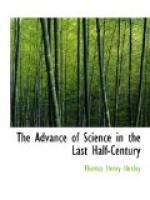[Sidenote: Greek and mediaeval science.]
It may be doubted if even-handed justice, as free from fulsome panegyric as from captious depreciation, has ever yet been dealt out to the sages of antiquity who, for eight centuries, from the time of Thales to that of Galen, toiled at the foundations of physical science. But, without entering into the discussion of that large question, it is certain that the labors of these early workers in the field of natural knowledge were brought to a standstill by the decay and disruption of the Roman Empire, the consequent disorganisation of society, and the diversion of men’s thoughts from sublunary matters to the problems of the supernatural world suggested by Christian dogma in the Middle Ages. And, notwithstanding sporadic attempts to recall men to the investigation of nature, here and there, it was not until the fifteenth and sixteenth centuries that physical science made a new start, founding itself, at first, altogether upon that which had been done by the Greeks. Indeed, it must be admitted that the men of the Renaissance, though standing on the shoulders of the old philosophers, were a long time before they saw as much as their forerunners had done.
The first serious attempts to carry further the unfinished work of Archimedes, Hipparchus, and Ptolemy, of Aristotle and of Galen, naturally enough arose among the astronomers and the physicians. For the imperious necessity of seeking some remedy for the physical ills of life had insured the preservation of more or less of the wisdom of Hippocrates and his successors, and, by a happy conjunction of circumstances, the Jewish and the Arabian physicians and philosophers escaped many of the influences which, at that time, blighted natural knowledge in the Christian world. On the other hand, the superstitious hopes and fears which afforded countenance to astrology and to alchemy also sheltered astronomy and the germs of chemistry. Whether for this, or for some better reason, the founders of the schools of the Middle Ages included astronomy, along with geometry, arithmetic, and music, as one of the four branches of advanced education; and, in this respect, it is only just to them to observe that they were far in advance of those who sit in their seats. The school men considered no one to be properly educated unless he were acquainted with, at any rate, one branch of physical science. We have not, even yet, reached that stage of enlightenment.
[Sidenote: Further advance after Renaissance.]
In the early decades of the seventeenth century, the men of the Renaissance could show that they had already put out to good interest the treasure bequeathed to them by the Greeks. They had produced the astronomical system of Copernicus, with Kepler’s great additions; the astronomical discoveries and the physical investigations of Galileo; the mechanics of Stevinus and the ‘De Magnete’ of Gilbert; the anatomy of the great




